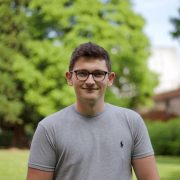Kyle Fogarty
Research Interests
Kyle’s research interests include, development of long-term autonomy for robotics, the theoretical development and practical application of computer vision, computer graphics, and machine learning techniques.
Publications
- Fogarty, K., Ametova, E., Burca, G., Korsunsky, A.M., Schmidt, S., Withers, P.J., and Lionheart, W.R.B. (2022) ‘Recovering the second moment of the strain distribution from neutron Bragg edge data‘, Applied Physics Letters.
- Bennett, J., Moncur, B., Fogarty, K., Clawson, G., and Fox, C. (2022) ‘Towards Open Source Hardware Robotic Woodwind: an Internal Duct Flute Player‘ International Computer Music Conference.
- Zhong, F., Fogarty, F., Hanji. P., Wu, T., Sztrajman, A., Speilberg, A., Tagliasacchi, A., Bosilj, P., & Oztireli, A. (2022). Neural Fields with Hard Constraints of Arbitrary Differential Order. arXiv:2306.08943 pre-print [cs.LG].
- Zhou, C., Zhong, F., Hanji, P., Guo, P., Fogarty, K. Sztrajman A., Gao, H., & Oztireli, A.C. (2023) FrePolad: Frequency-Rectified Point Latent Diffusion for Point Cloud Generation, ArXiv pre-print.
- Foster, J., Fogarty, K., Schoepf, S., Oztireli, A.C., & Brintrup, A. (2024) Zero-Shot Machine Unlearning at Scale via Lipschitz Regularization, arXiv pre-print.
- Yang, J., Fogarty, K., Zhong, F., & Öztireli, C. (2024) SYM3D:Learning Symmetric Triplanes for Better 3D-Awareness of GANs, pre-print.
Presentations
- “An Introduction to Uncertainty Quantification” (oral) – EPSRC CDT in Modelling of Heterogeneous Systems (HetSys) Computational Toolkit Seminar Series [March 2022] – Online.
- “Monte Carlo methods for Uncertainty Quantification” (oral) – EPSRC CDT in Modelling of Heterogeneous Systems (HetSys) Computational Toolkit Seminar Series [March 2022] – Online.
- “Surface reconstruction of point clouds” (poster) – AgriFoRwArdS CDT Annual Conference 2022 [June 2022] – Lincoln, UK.
- “Stand-Alone, Easy-to-Scale and Low-Overhead Robotic Fish & Chips Dark Kitchen” (oral) – AgriFoRwArdS CDT Summer School 2022 [July 2022] – Norwich, UK.
- “Towards Open Source Hardware Robotic Woodwind: an Internal Duct Flute Player” (oral) – International Computer Music Conference (ICMC) 2022 [July 2022] – Online.
- “3D Modelling of Natural Structures” (oral) – AgriFoRwArdS CDT Quarterly PhD Research Progress Meeting [January 2023] – Online.
- “Team Toast” (oral) – AgriFoRwArdS CDT Summer School 2023 [March 2023] – Lincoln, UK.
- “3D Modelling of Natural Structures” (oral) – AgriFoRwArdS CDT Quarterly PhD Research Progress Meeting [July 2023] – Norwich, UK.
- “Neutral Geometry Processing for 3D Natural Structure Modelling” (poster) – Towards Autonomous Robotic Systems (TAROS) 2023 / AgriFoRwArdS CDT Annual Conference 2023 / Joint Robotics CDT Annual Conference 2023 [September 2023] – Cambridge, UK.
- “Beyond 2D images” (oral) – AgriFoRwArdS CDT Summer School: Robotic Phenotyping [July 2024] – Wageningen, The Netherlands.
- “Neural Geometry Processing” (poster) – AgriFoRwArdS CDT Summer School: Robotic Phenotyping [July 2024] – Wageningen, The Netherlands.
Other Activities
- Represented the AgriFoRwArdS CDT in the AgriFoRwArdS CDT video.
- Member of the AgriFoRwArdS CDT Advisory Board (June 2023 to present).
- Member of the AgriFoRwArdS CDT Student Panel (March 2022 to present).
About me
My name is Kyle, and I am excited to have joined the AgriFoRwArdS CDT community in October 2021. Before joining the CDT, I studied for an integrated master’s degree in Mathematics and Physics at the University of Manchester, concentrating on the areas of scientific computing, uncertainty quantification, and statistical physics. While in Manchester I also had the opportunity to undertake a research project on Bragg-edge neutron strain imaging, where I used data collected at the IMAT instrument at ISIS, UK, to map the residual strain within a strained material. I am looking forward to applying the knowledge and skills I gained in Manchester to the difficult challenges that present themselves in agri-food robotics.
I was born in Lincoln and grew up in a small town not too far away, and I am very much looking forward to being back in this beautiful, quaint, city. After I complete my studies in Lincoln, I will be moving to study my PhD at the University of Cambridge in the department of computer science and technology under the supervision of Dr Cengiz Öztireli.
Away from academia, I like to stay active, going to the gym and running. I also really enjoy travelling, both exploring new cities around the UK, with York being one of my recent favourites, and exploring the hills and valleys when hiking.
MSc Project
Surface reconstruction of point clouds
The ability to accurately perceive and model natural structures is a central consideration of many robotic applications in agriculture. While point clouds offer a flexible representation of 3D geometry and constitute the raw output of many sensors, reconstructing a continuous surface from a discrete point set is often desirable. In this project, we propose a novel neural-based algorithm for surface reconstruction that leverages the representation power of neural networks to produce high fidelity models of natural structures.
PhD Project
3D Modelling of Natural Structures
The creations of models of reality are fundamentally what all scientific disciplines strive to achieve. Over the past several decades, the problem of accurately producing high-quality projections (i.e., images and video) of reality has been largely solved. However, producing high-fidelity 3D models of visual reality that are easy to create, manipulate, visualise, and analyse is an open problem with many technical challenges.
This project aims to explore several technical challenges in relation to geometry processing, scene representation, and visual perception, for producing high-fidelity 3D models of visual reality with an emphasis on modelling natural structures. Using point clouds as a method of geometry acquisition and leveraging recent advances in machine learning, we will take a data-driven approach to developing new algorithms and computational techniques to solve these technical challenges.
Aside from the technical skills developed to deliver these new computational techniques, the student will have lots of opportunities to develop their broader academic skills in a comprehensive research skills programme. Furthermore, they will also have lots of opportunities to learn from and collaborate with a broad network of experts within Cambridge and the wider academic sphere.
Kyle’s PhD project is being carried out with primary supervision by Dr Cengiz Öztireli.

